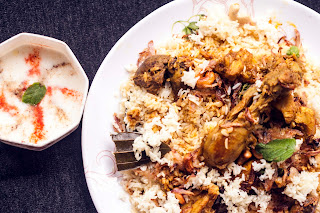A Touch
of Culinary Brilliance at Home
Text & Photo by Ashok Karan | ashokkaran.blogspot.com
Recently, we
hosted a small, intimate lunch gathering at our home. On the menu was a simple
yet sumptuous spread of chicken curry with rice, accompanied by fresh salad,
tangy chutney, and a selection of desserts. The guests not only enjoyed the
meal—they relished it, many even complimenting the flavors and warmth of
the cooking.
What made
the occasion even more special was that most of the dishes were prepared by my
wife, who has a true flair for culinary arts. After the guests left, satisfied
and smiling, we discovered that a good portion of chicken curry was still left
in the serving dishes.
True to her
creative instincts, my wife transformed the leftover chicken curry the next day
into a fragrant and flavorful Biryani. She paired the curry with freshly
prepared Basmati rice, layering it with herbs, spices, and caramelized onions.
The result? A mouthwatering homemade Biryani that served three generously and
tasted as though it came from a professional kitchen.
Over the
years, friends and guests alike have often sought cooking tips from her, and
rightly so. I’ve seen her passion firsthand—browsing through culinary books,
magazines, and countless YouTube tutorials. It’s no wonder she’s become such an
accomplished home chef.
When I asked
her about her Biryani preparation, she explained it beautifully:
“Biryani is
a celebratory dish—an aromatic medley of rice, meat, and spices, made with love
and patience. Traditionally, it’s cooked using the dum pukht method,
where the ingredients are slow-cooked in a sealed pot to allow the flavors to
meld.”
She shared
insights into the two most popular Biryani preparation methods:
1.
Kachchi Dum Biryani – Raw marinated meat is layered at the bottom of a pot, topped with
semi-cooked rice, saffron milk, herbs, and fried onions. The pot is sealed and
slow-cooked on low flame, producing tender, flavor-rich results.
2.
Pakki Dum Biryani – The meat or chicken is first cooked into a rich gravy, then partially
cooked rice is layered over it. The sealed pot is then gently steamed to infuse
the flavors—ideal for a restaurant-style experience at home.
For both
methods, she emphasized three golden rules for a perfect Biryani:
- Use high-quality spices
and authentic Biryani masala. - Choose premium Basmati rice—long,
aromatic grains make all the difference. - Ensure well-marinated meat
for tenderness, preferably with yogurt and spices.
The Biryani
she prepared wasn’t overly oily or spicy. It struck the perfect balance, and
was best enjoyed with raita, shorba, crispy papad, and a cool glass of lassi.
In
picture: Homemade
Chicken Biryani prepared with leftover chicken curry, served fresh the next
day.
📸 Text & Photo by Ashok
Karan
🌐 ashokkaran.blogspot.com
🙏 Please like, share, and subscribe.
#CulinarySkill
#HomeChefDiaries #BiryaniLove #LeftoverTransformation #DumPukht
#HomeMadeWithLove #KitchenChronicles #FoodPassion #IndianCuisine #BasmatiMagic
#FoodBloggersIndia



Leave a Reply